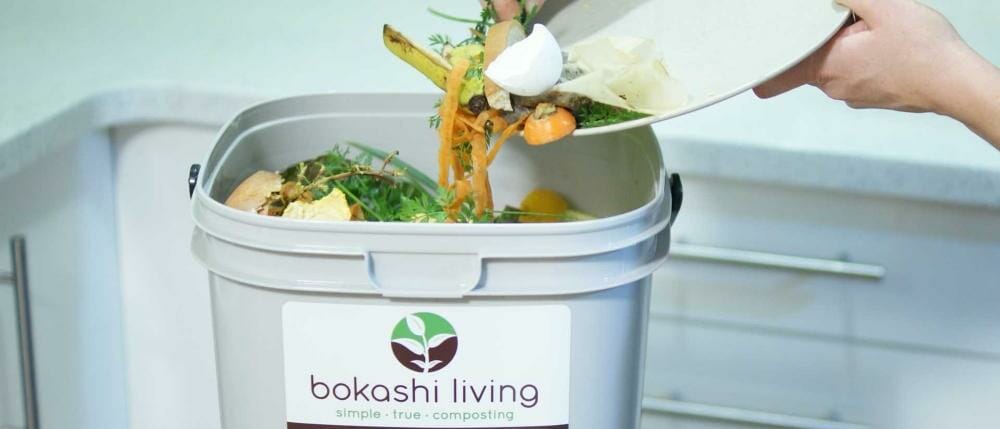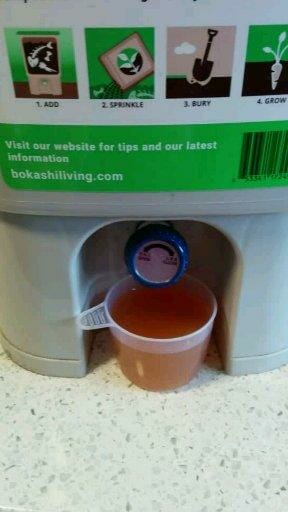Beginners Guide to Bokashi Composting: What Is Bokashi Composting?
Bokashi composting is a great way to compost all food waste. Bokashi composting uses beneficial microbes to quickly and easily convert food waste into microbe and nutrient-rich compost. It is rapidly becoming many gardeners’ preferred way to compost at home and to build healthy, productive soils.
The key to the Bokashi process is fermentation. In using the Bokashi bin, you are in effect rapidly fermenting your food waste, and in doing so converting it to a microbe rich format that becomes extremely accessible to your soil ecology and plant roots.
In just two weeks after burying your fermented food waste in your garden, it will be assimilated into the surrounding soil web, where it will benefit everything from microbes to macrobes, and in turn the plants themselves. The more you do this, the better and more natural your garden will become.

Benefits of bokashi composting
Bokashi composting has a number of benefits over traditional composting. It is fast. With bokashi composting, you’ll get finished compost in just 4 to 6 weeks.
Bokashi composting also allows you to compost all food waste. With bokashi composting you can compost items that are usually avoided in traditional composting, including meat, dairy, grains, and cooked food.
Bokashi composting and soil health: what you need to know
To truly appreciate why bokashi is so beneficial for your plants and gardens, let’s first look at what makes a healthy soil structure, how it affects your plant roots, and where bokashi fits into it all.
In a nutshell, healthy soil is soil that is full of life, and plenty of organic matter for that life to feed off. This life consists of visible life (macrobes; think worms and bugs etc) and invisible life (microbes; consisting of yeasts, bacterias and fungi).
As with most life on earth, it’s the smallest creatures at the bottom of the food chain that are the key ones. And in the soil’s case, these key creatures are the microbes. Healthy soil begins with microbes. If soil has plenty of microbes, the rest of the life will happily come and join them.
Why are soil microbes so important to your plants?
Until recently, plant roots were considered to be a one way street – with water and nutrients simply directed upwards through the plant roots. But this is not the case. Modern soil biologists have discovered that plant roots are actually a two way system.
In fact, plants send almost 40% of their energy down into their roots. This energy is released, all around the root zone, in the form of sugary carbohydrates (exudates).
These exudates have the specific purpose of attracting microbes to the plants’ roots. And it is these microbes, through their digesting of the minerals and nutrients from the soil that actually feed the plants. A healthy plant, in healthy soil, will have beneficial microbes thriving all around its root zone.
This is possibly the most important symbiotic relationship: plants feed the microbes, and in turn the microbes feed the plants. This is nature’s process and has been refined and perfected over millennia. If the soil is lacking in microbes, then the plants will suffer.
How bokashi composting helps generate microbes
Bokashi composting is simply a process of using your valuable food waste to generate millions of these garden friendly microbes, yeast, and fungi (all of which are contained in a dormant state within the Bokashi bran).
These microbes come alive and multiply when they are added to your food waste. When the bokashi food waste (pre-compost) is dug into your garden these garden-friendly microbes immediately benefit the soil structure and plants living in it.
These bokashi microbes are arguably the biggest benefit of using bokashi composting in your garden.
How to bokashi compost
Bokashi composting is a fast and easy 4 step process. Simply add food waste to the indoor bokashi kitchen composter, sprinkle with the bokashi bran mixture, wait for the results, and then transfer to your garden. It takes just 4 to 6 weeks for your food waste to be transformed into microbe and nutrient rich compost.
Step 1: Add waste to your bokashi bucket
All food waste can be added to your bokashi bucket; fruits and veggies, baked goods, cooked food, dairy, and even meat. If you can eat it, then it can go in your bokashi bin. Food waste should be chopped into 1-2” pieces. Larger pieces will work, but may take longer to fully ferment.

Step 2: Add bokashi bran
Every time you add food waste to your bokashi bucket, sprinkle a small amount of bokashi bran. Add approximately 1 tablespoon of bokashi bran for each 1” layer of food waste. Add food waste and bran to your bokashi bucket every day or two. Press down the food waste and repeat until the bucket is full.
Once the bokashi bucket is full, put the lid on and let it sit at room temperature for 2 weeks.
Remember to drain the bokashi tea every day or two. The bokashi tea is teeming with beneficial bokashi microbes and makes a fantastic fertilizer.
Step 3: Bury
After two weeks, the bokashi food waste is ready to be added to your garden. You should smell a sweet pickle smell and you may see white mold. These are both indicators of successful bokashi fermentation. The bokashi pre-compost can be buried directly in your garden, planters, soil factory, or compost pile.
Step 4: Grow
Two weeks after burying, the bokashi pre-compost will be fully assimilated into the soil food web. Plant roots will thrive with the newly added microbes and nutrients from the bokashi compost. Watch your garden flourish!

